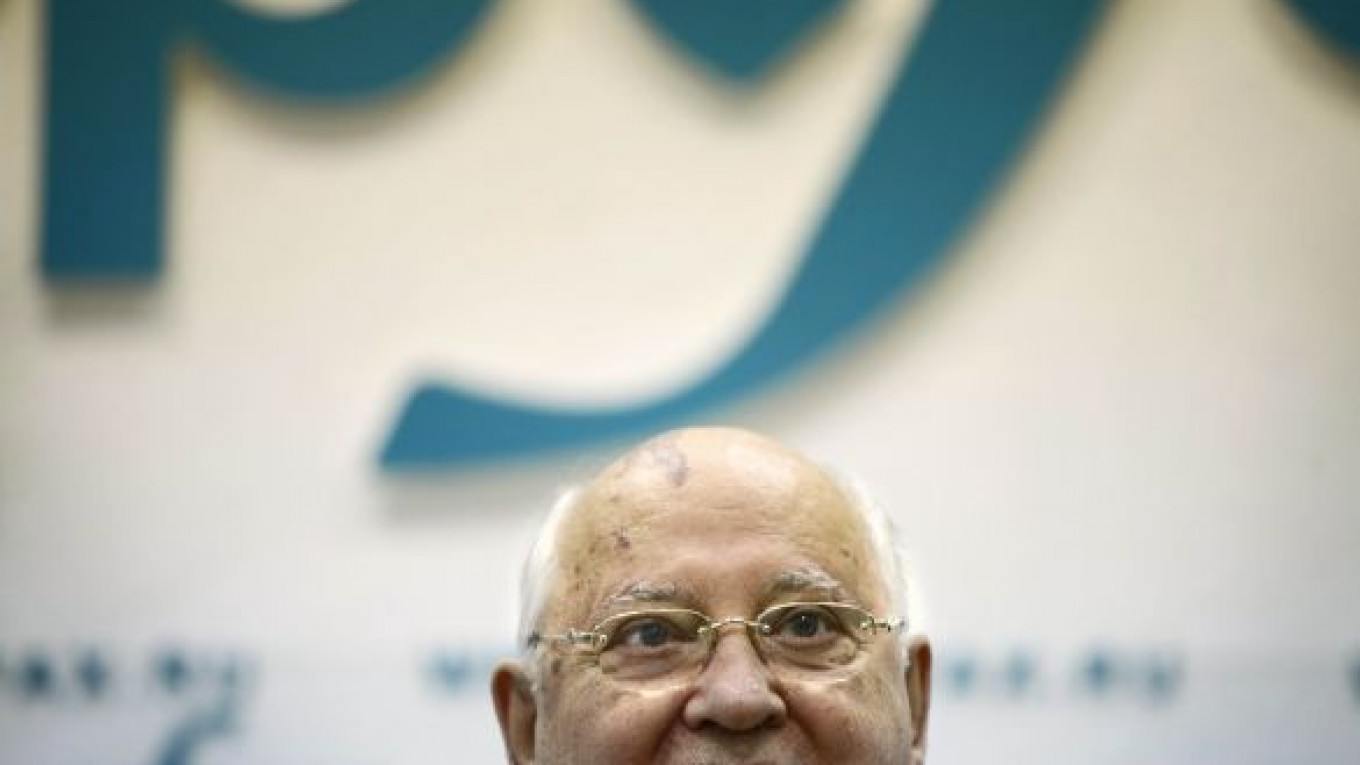Two days short of the 20th anniversary of the failed coup d'etat against him, former Soviet leader Mikhail Gorbachev eagerly relived the twists and turns of his political career — and criticized Russia's political present.
Dozens of reporters crowded into a news conference hall in downtown Moscow on Wednesday to listen to Gorbachev, 80, criticize Prime Minister Vladimir Putin, praise billionaire Mikhail Prokhorov, and recall with fondness the policies of Belarussian President Alexander Lukashenko.
Gorbachev found some good words for Putin, saying the restrictions on political freedoms that he has imposed during his decade in power were unavoidable.
But he said it was time for Putin to go and for his policies to change.
"In short, I'm unhappy," Gorbachev said.
Warning that Russia is "going backward" under the current leadership, Gorbachev called for re-establishment of direct gubernatorial elections and single-mandate votes in legislative polls. He dismissed as "unnecessary" Putin's new election vehicle, the All-Russia People's Front, created to boost votes for Putin's United Russia party in the State Duma elections in December.
He also praised the revival of the Right Cause party, although he expressed a tint of regret that it happened "on the Kremlin's order." The party, established in 2008 as a pro-Kremlin liberal project and flagging since, is set for a comeback under its new leader Prokhorov.
"I like him," Gorbachev said about Prokhorov. He predicted that Right Cause would clear the 7 percent election threshold.
Gorbachev generally cut an amiable, down-to-earth figure. He called reporters "politicians whom a lot depends on," addressed them with the informal Russian pronoun "ty," which implies a degree of intimacy, and often referred to himself in the third person.
Yet he displayed his old apparatchik skills, carefully dodging questions about who he would vote for in the Duma elections and his opinion about Ukrainian President Viktor Yanukovych and the trial over former Prime Minister Yulia Tymoshenko.
But he had good memories about Lukashenko, whom he said was among the few leaders who opposed the disbandment of the Soviet Union.
"I have always supported and defended Lukashenko. He was the only one among the Belarussian deputies who opposed the Belavezha Accords," Gorbachev said, referring to the 1991 agreement that sealed the end of Soviet Union.
But Gorbachev said "something has happened" with Lukashenko that has changed him into an "elephant in a china shop."
Gorbachev dwelled on his days in power more than on current affairs during the news conference, stressing, in particular, that the Soviet state could have offered a path to gradually transform into a democracy — as Gorbachev said he had planned.
"Some say over and over that the Soviet Union's collapse was unavoidable, but I keep on saying that the Soviet Union could have been preserved," he said.
He promised a detailed account of his rule and plans in an upcoming memoir. He did not give a publication date.
A Message from The Moscow Times:
Dear readers,
We are facing unprecedented challenges. Russia's Prosecutor General's Office has designated The Moscow Times as an "undesirable" organization, criminalizing our work and putting our staff at risk of prosecution. This follows our earlier unjust labeling as a "foreign agent."
These actions are direct attempts to silence independent journalism in Russia. The authorities claim our work "discredits the decisions of the Russian leadership." We see things differently: we strive to provide accurate, unbiased reporting on Russia.
We, the journalists of The Moscow Times, refuse to be silenced. But to continue our work, we need your help.
Your support, no matter how small, makes a world of difference. If you can, please support us monthly starting from just $2. It's quick to set up, and every contribution makes a significant impact.
By supporting The Moscow Times, you're defending open, independent journalism in the face of repression. Thank you for standing with us.
Remind me later.






